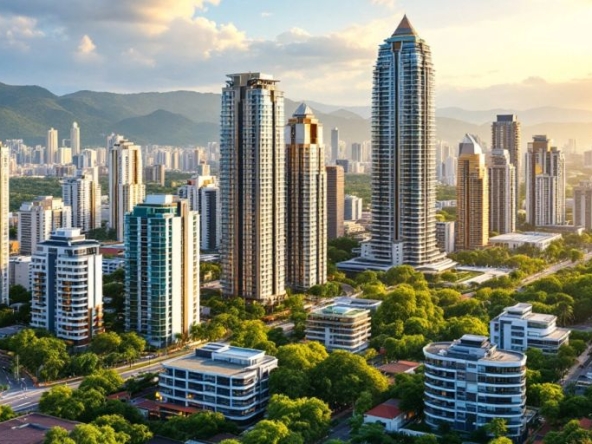Local real estate executives have expressed strong support for proposed measures aimed at boosting foreign investment in Thailand’s property market. Key proposals include extending land lease periods to 99 years and increasing the foreign ownership quota in condominiums from 49% to 75%. These changes are seen as vital for revitalising the struggling real estate sector and attracting international buyers.
Key Takeaways
- Proposed extension of land lease periods to 99 years.
- Increase in foreign ownership quota for condominiums from 49% to 75%.
- Discussions initiated by a cabinet resolution aimed at stimulating the economy.
- Potential benefits for both Thai and foreign nationals.
- Legislative changes expected to take one to two years to implement.
Proposed Changes To Land Lease Periods
The first significant proposal discussed involves extending the maximum land lease period from 30 years to 99 years. This amendment would allow property owners and lessees to agree on a lease extension of up to 50 years after the initial term, provided it is documented and registered with the authorities. This change is expected to apply to both low-rise residential projects and condominiums, benefiting a wide range of stakeholders.
Increase In Foreign Ownership Quota
Another major proposal is to raise the foreign ownership limit in condominiums from 49% to 75%. This change aims to attract more foreign buyers, particularly in popular areas such as Bangkok, Phuket, and Pattaya. However, conditions may be imposed, such as forfeiting voting rights in condominium management for foreign owners exceeding the 49% threshold.
Economic Context And Implications
The discussions were prompted by a cabinet resolution in April, which sought to stimulate the economy through the real estate sector. The Ministry of Interior has been tasked with studying the feasibility of these amendments, which could significantly impact the market, currently facing challenges such as high bank loan rejection rates and declining purchasing power.
Peerapong Jaroon-ek, honorary president of the Thai Condominium Association, noted that without these policy interventions, the real estate market could contract by 15% to 20% in 2024. The proposed changes are expected to make urban land more accessible, reduce development costs, and enhance the affordability of city properties for Thais.
Current Market Challenges
The real estate sector is currently grappling with several challenges, including a 19.7% drop in land allocation permits in the first quarter of the year, marking the largest decline in nine quarters. Additionally, sales of new townhouses in Greater Bangkok have reached a 12-year low, primarily due to weak demand in the middle and lower-end segments.
Despite these challenges, the Real Estate Information Center (REIC) reported a 25% increase in condo transfers by foreigners in 2023, totalling 14,449 units. The value of these transactions rose by 23.5% to 73.1 billion baht, surpassing pre-pandemic levels. Chinese buyers have been the most active, accounting for nearly half of the total units transferred.
Conclusion
The proposed measures to extend land lease periods and increase foreign ownership quotas are seen as crucial steps towards revitalising Thailand’s real estate market. As discussions continue, stakeholders remain optimistic that these changes will attract foreign investment and stimulate economic growth in the sector.




